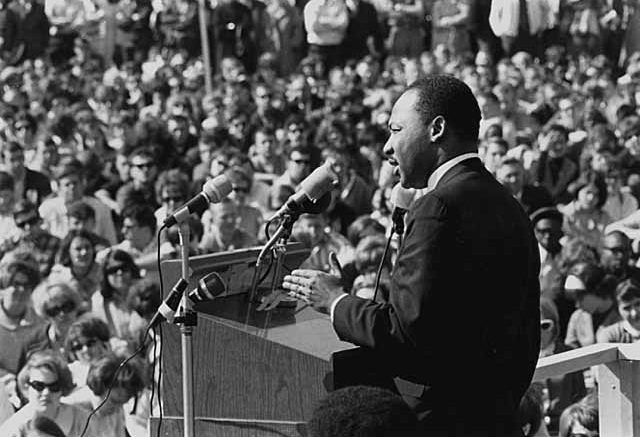- In 2010, 51% Had Positive Views of Race Relations in NY
- Three-Quarters Say that Ethnic/Racial & Religious Minorities in NY Experience
- Discrimination; More than One-Third Say They’ve Been Treated Unfairly in Last Year Because of Their Race, Religion, Ethnicity, Gender or Sexual Orientation
Loudonville, NY. As New Yorkers commemorate the birthday of Martin Luther King, Jr., only 33 percent of New Yorkers think race relations in the state are excellent (five percent) or good (28 percent) – compared to
64 percent who say they are fair (42 percent) or poor (22 percent), down a little from last year’s Siena College poll, when 35 percent viewed race relations positively and 62 percent negatively, according to a new Siena College poll of New York State registered voters released today. In 2010, a majority of New Yorkers, 51 percent, had a positive view of race relations in the state.
Nearly three-quarters of voters (73 percent) say racial ethnic minorities who live in New York experience discrimination, up from 68 percent last year, while more than three-quarters (78 percent) say religious minorities experience discrimination, a new question this year in light of the numerous anti-Semitic acts of late.
“New Yorkers’ views on race relations today are nearly as negative as they have ever been over the last dozen years. Since 2008, only 2015 saw New Yorkers more negative about race relations in the state,” said Siena College pollster Steven Greenberg. “Interestingly, these negative views on the state of race relations in our state are across the board. At least 60 percent of whites, blacks, Latinos, upstaters and downstaters, liberals, moderates and conservatives all view race relations negatively.
“While 71 percent of white voters say that ethnic and racial minorities experience discrimination in New York, so do 81 percent of Latinos and 91 percent of black voters. Similarly, at least 70 percent of Jews, Catholics and Protestants, and blacks, whites, and Latinos say religious minorities in New York experience discrimination,” Greenberg said. “Although there is a partisan difference with Democrats more likely to think minorities face discrimination, a majority of Republicans think racial (54 percent) and religious (69 percent) minorities experience discrimination in New York.”
“More than one-third of New Yorkers – 35 percent – say that in the last year they have been treated unfairly because of their race, religion, ethnicity, gender, or sexual orientation. Last year, only 30 percent said they were treated unfairly, however, last year the wording of the question did not include religion,” Greenberg said. “Thirty percent of white voters say they were treated unfairly based on discrimination, compared to 39 percent of Latinos and 61 percent of black voters
“If 35 percent of 12 million New York voters were treated unfairly last year because of their race, religion, ethnicity, gender, or sexual orientation, that means that more than 4.2 million New Yorkers faced discrimination based on who they are or what they look like. That is certainly not a legacy that would make Dr. King proud,” Greenberg said.
Sexual Harassment in Workplace Remains a Significant Problem
“Three-quarters of women and 69 percent of men agree that sexual harassment in the workplace in New York is a significant problem, compared to only 22 percent of men and 21 percent of women who say it’s not a significant problem,” Greenberg said. “Overall, 72 percent of New Yorkers think it’s a significant problem, up a little from 70 percent last year, while 22 percent say it’s not a significant problem.
“Nearly half of New York women – 45 percent – say that they have been a victim of sexual harassment at some point in their lives, unchanged from last year, compared to only 14 percent of men who say they’ve been victimized by sexual harassment,” Greenberg said. “While only about 28 percent of downstaters say they’ve been the victim of sexual harassment, 38 percent of upstaters say they’ve been subjected to sexual harassment.”
This Siena College Poll was conducted January 11-16, 2020 by telephone calls conducted in English to 814 New York State registered voters. Respondent sampling was initiated by asking for the youngest male in the household. It has an overall margin of error of +/- 4.1 percentage points including the design effects resulting from weighting. Sampling was conducted via a stratified dual frame probability sample of landline (ASDE) and cell phone (Dynata) telephone numbers from within New York State. Data was statistically adjusted by age, party by region, race/ethnicity, and gender to ensure representativeness. The Siena College Research Institute, directed by Donald Levy, Ph.D., conducts political, economic, social and cultural research primarily in NYS. SCRI, an independent, non-partisan research institute, subscribes to the American Association of Public Opinion Research Code of Professional Ethics and Practices. For more information, call Steve Greenberg at (518) 469-9858. For survey crosstabs: www.Siena.edu/SCRI/SNY.




